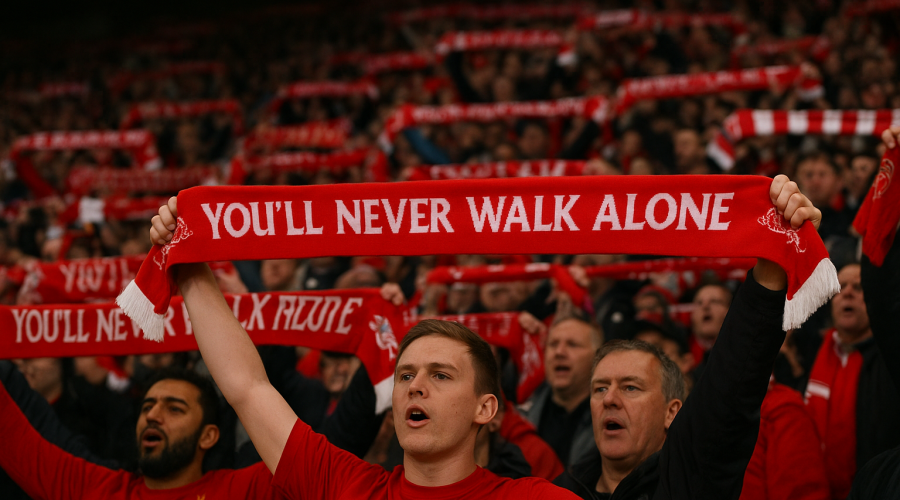The Origins of “You’ll Never Walk Alone”
Before it echoed through the stands of Anfield, “You’ll Never Walk Alone” began as a show tune in the 1945 Rodgers and Hammerstein musical Carousel.
In the 1960s, the Liverpool-based band Gerry and the Pacemakers covered the song — and their version quickly reached the top of the UK charts.
When fans at Anfield adopted it soon after, no one could have imagined that it would become one of football’s most powerful anthems.
How the Song Became Liverpool’s Symbol
During the early 1960s, Anfield’s famous Kop stand was known for singing along to the latest hits played before kickoff.
When “You’ll Never Walk Alone” started playing, the entire crowd joined in — and it simply never stopped.
What made it different was its message of unity and hope — perfect for a working-class city that lived and breathed football.
The Anthem Through Tragedy and Triumph
Over the years, the song became more than a chant.
It turned into a comforting symbol during Liverpool’s darkest moments, especially after the Hillsborough disaster in 1989, when 97 fans lost their lives.
In moments of grief, the anthem reminded everyone that no one walks alone — not in life, not in loss, and not in football.
But it also became the sound of victory — echoing through Istanbul 2005, Madrid 2019, and countless unforgettable nights.
Global Impact – More Than Just a Song
Today, “You’ll Never Walk Alone” isn’t just a Liverpool tradition.
Clubs like Celtic, Borussia Dortmund, and even fans in Japan sing it — proof that its message reaches far beyond Merseyside.
Still, nowhere in the world does it carry the same emotional power as Anfield.
When 50,000 voices rise together before kickoff, it’s not just football — it’s faith, loyalty, and belonging.
What It Means to Be a Liverpool Supporter
For Liverpool fans, singing “You’ll Never Walk Alone” is like a ritual — a shared promise that through highs and lows, we stand together.
It connects generations, unites strangers, and reminds us what it means to belong to the Liverpool family.
When that final line echoes — “Walk on, walk on, with hope in your heart” —
you don’t just hear it. You feel it.

